Understanding Greek mythology is essential for a good education as the Greek culture is basically the foundation of modern European and American cultures. Mythology is a collection of stories created by an early civilization in order to make sense of the world, to explain its creation and how it was run by the gods. It is more than fiction as all legends and stories of old have some grain of truth to them, although viewed from the present it is impossible to separate fact from fiction.
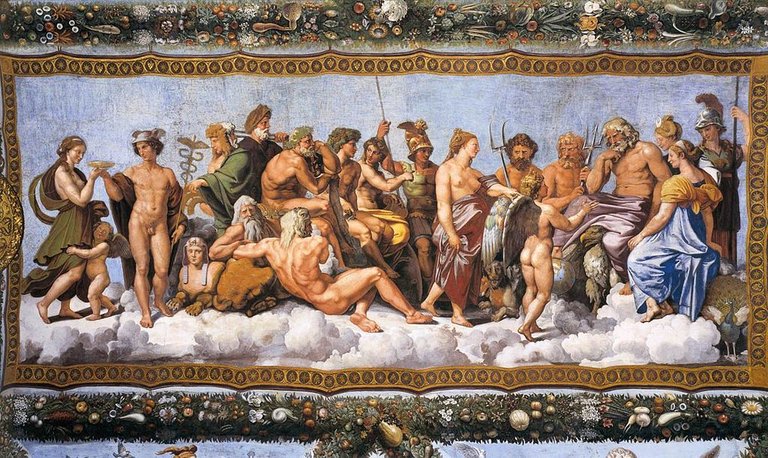
The Olympian gods as imagined by Italian painter Raffaello
Schools today have no time for stories of old, everything is about maths and tests, so it is mainly the job of parents to introduce them to their children. And, no, they're by no mean irrelevant today, as so many words we use come from ancient Greek and the planets in our Solar system all bear the name of those ancient gods, in their Latin form. Olympic games - who do you think they where first held for?
As famous scholar Robert Graves wrote in 1955:
“Myth has two main functions. The first is to answer the sort of awkward questions that children ask, such as ‘Who made the world? How will it end? Who was the first man? Where do souls go after death?’…The second function of myth is to justify an existing social system and account for traditional rites and customs.”
An essential part of a mythology is the cosmogony part – how the world came to be. For the ancient Greeks, things were pretty forthright – everything was created from Chaos. The first gods to come out of Chaos were personifications of the fundamental parts of the world. They were:
Gaea - the Earth – later called Terra by the Romans.
Tartarus – the Abyss or the underworld where dead souls were sent.
Also out of Chaos came Nyx (the Night) and Erebus (the Darkness)
As in many other religions, the Greek mythology offers an example of virgin birth, with Uranus being given life by Gaea, without the assistance of a male.
Uranus (the Sky) was later known as Caelus in the Roman adaptation of Greek myths.
Saving Zeus from his father's apetite
Gaea and Uranus had many children, more important amongst them being the 12 Titans. Of particular interest for the Greek mythology are Cronos (time) and Rhea (representing fertility and motherhood).
These two are the parents of all the major gods in Greek mythology. Since any good story needs an interesting plot, legend has it that Cronos had been cursed to be killed by one of his own children, which is why he decided to swallow them as soon as they were born. Poor Rhea gave birth to five children, dutifully handing them to her husband to eat them. When her sixth child was born she could not bear to lose another one and she presented to Cronos a rock wrapped in cloth, which he again swallowed.
The lucky newborn that had been spared was Zeus, the most important god in Greek mythology. The curse came true when Zeus was old enough to kill his father and free his brothers and sisters from his belly. Out came Hera, Poseidon, Hades, Hestia and Demeter. The six divided the world between them.
Zeus (Jupiter) – the thunder god rules over all of them from his place of residence on Mt.Olympus. He married his sister Hera (Juno), who was goddess of women and marriage.
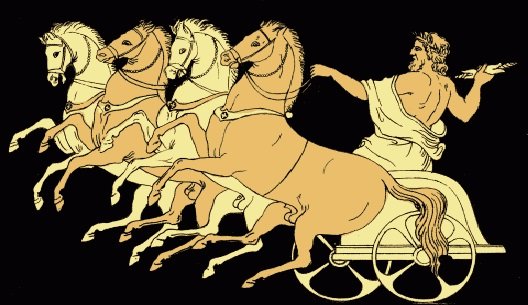
Chariot of Zeus
Poseidon (Neptune) – became god of the sea and other waters. Sailors prayed to him for a safe journey.
The third brother, Hades (Pluto), was not too happy when he was left to rule the underworld, but there was little he could do about it.
Hestia (Vesta) became the goddess of the hearth, the family and the home, although she never got married or had kids
Finally, the sixth of Cronos' children Demeter (Ceres) was the goddess of agriculture and harvest. She revealed to mankind the art of growing and using corn. Without her we'd have no popcorn at the movies!
The merry gang
The Olympian family grew bigger with the birth of the many children of Zeus, some with his wife Hera, some with other women.
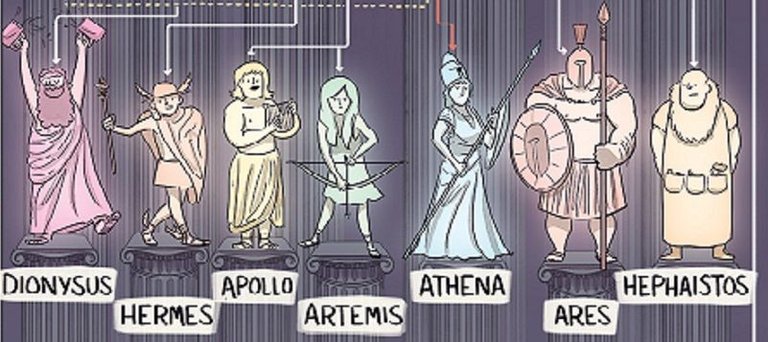
Apollo - the god of music and poetry, truth and prophecy, but also of the the sun, light and the plague.
Artemis (Diana) - goddess of the wilderness, the hunt and wild animals.
Athena (Minerva) - goddess of wisdom, crafts, war, diplomacy, but also weaving. She was born from Zeus' head!
Ares (Mars) - god of war, not a very pleasant guy. Legend has it even his parents, Zeus and Hera, hated him.
Hermes (Mercury) messenger to the gods, but also protector of shepherds, athletes, thieves, and merchants.
Hephaistos (Vulcan) - blacksmith for the gods, he made all of the weapons for the residents of Olympus. Although he was the least good-looking of the lot he got to marry the beautiful Aphrodite (Venus), goddess of love.
Of no small interest is Aphrodite's son Eros (Cupid), the little guy with the bow, the one you see on St.Valentine cards. Little Eros likes to shot arrows to make people fall in love, sometimes the targets are picked by his mother, but other times he likes a little mischief of his own.
The merriest of the Olympians, Dionysus (Bacchus) was in charge of grape harvest, winemaking, wine and the theater.
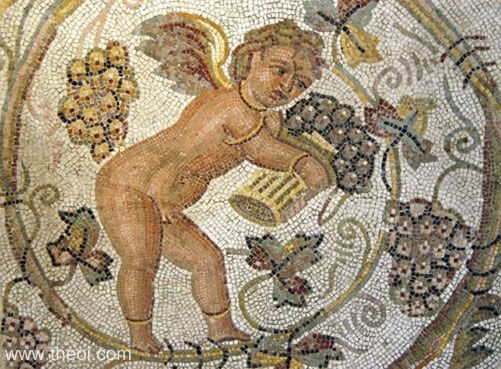
Eros picking grapes - ancient mosaic found in Carthage
Our homeschooling project
This is just a general presentation of the big Olympian family. To make children fall in love with Greek mythology one has to read all their colorful stories, full of adventures, petty rivalries and revenge. When I was a kid I was fascinated by their many love stories, what can I say females are more romantic by nature. When I read the same old book to my son, he was interested instead by the Trojan war and had me read it to him over and over again, and it was a long war.
This post is in part a homeschool project, as I wanted to refresh my son's memory. His contribution to this post is looking up all the important gods, find their Roman names and list their particular responsibilities. (As ha hates the idea of paper and pencil, he wrote them on his computer and mailed them to me in the other room!) As a matter of fact, the idea for this post/project came to me while playing with him a computer game, where we found a 'Midas plate' so I told him it's a reference to the Greek king Midas of the golden touch. Also, looking through our mythology books we came across the story of Arachne, cursed to become a spider - that's because he's very proud of knowing a very scientific term like arachnophobia! It all goes back to ancient Greece!

For further study, here are a few good links:
http://www.theoi.com/ (in-depth look at all gods, mythological creatures)
http://greece.mrdonn.org/myths.html (very good for kids, with many stories)
http://www.history.com/topics/ancient-history/greek-mythology (offers many educational videos, short enough so the kids won't get bored)
http://www.veritablehokum.com/comic/the-greek-god-family-tree/ (excellent to explain how all the gods are related to one antoher - nice if you can print it)
Thanks for reading
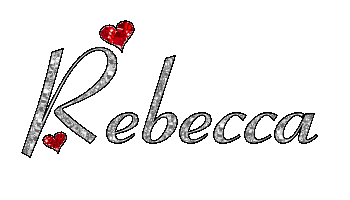
I'm particularly fond of Ares- he's the one I identify the most with. Unlike your son, I hate writing on the computer (I just posted about how I write)... But then again, I'm really old!
I cannot say I identify with any of them - I admired Zeus because he got all the chicks, the original bad boy girls fall in love with!
Jeez... I thought that was me... Never fails, every chick I've ever had a long term relationship with said it was because "I made them feel safe."
Great post, Rebecca. I know exactly when I first became interested in the Greek gods. Clash of the Titans, the 1981 version that used the wonderful stop-motion animation. I don't know how old I was when I first saw it, 5 or 6 maybe, but I loved it and watched it over and over. That film led me to want to know as much as I could about the Greek gods.
I moved on to all the Hercules movies I could find (the Lou Ferrigno ones were awesome) but I always insisted on calling him Herakles after learning his Greek name, even tho that meant a lot of people didn't know who I was talking about.
Reading both of Homer's epics long before I could really understand them. And so on. I've been reading about Greek myth ever since.
Anyway, great post. I hope your son develops a love of these wonderful myths too.
It's definitely Herakles for me, from the old book I mentioned!
As a kid I was in love with ancient mythology. Ares and Hermes were my favorites! Nice to see that you try to get more children interested in the topic :)
The writer Robert Bly cites that bottom quote.
I didn't know that. Thank you very much.
( I am also a huge fan of Thomas Bullfinch, if you missed him you've missed something big)
I have to admit I haven't read this guy, but from what I've checked out about him I have a feeling that the Romanian author that wrote the mythology books of my childhood must have been inspired by Bullfinch.
Also.....Frazer's "Golden Bough"!
It's in the introduction to his groundbreaking work on manhood, "Iron John" in which he dissects the symbolism of a few of Grimm's Fairy Tales and compares it to initiatis traditions, then ties it to the problems faced by generations of modern men. He also reference Campbell a lot. Really great read for anyone, but a must-read for men.
@eileenbeach has voted on behalf of @minnowpond. If you would like to recieve upvotes from minnowpond on all your posts, simply FOLLOW @minnowpond. To be Resteemed to 4k+ followers and upvoted heavier send 0.25SBD to @minnowpond with your posts url as the memo
I have been blogging a book a paragraph at a time here on Steemit. It is a book on Diogenes of Sinope and on the Cynic school of philosophy more generally. It is in the public domain so I can blog it. It is a good introduction to classical philosophy because it contains quotes from many classical writers. I link to their entries in Wikipedia. I studied the Ancient Greek language in college.
A good primer, @ladyrebecca. Thanks, it's got me interested again in the Classics.